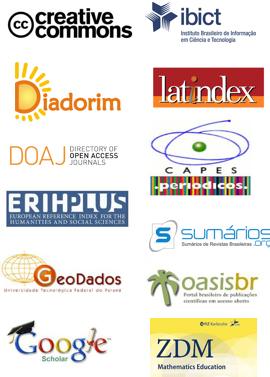Estudo Propositivo para Aprendizagem Significativa das Equações Algébricas do Primeiro Grau Através do Scratch
DOI:
https://doi.org/10.17921/2176-5634.2020v13n3p329-342Resumo
Resumo
A compreensão da variável algébrica tem sido amplamente discutida, com diferentes populações e através de diferentes ferramentas. No entanto, há poucos estudos investigando a sua abordagem através do uso de recursos computacionais. Neste sentido, este trabalho avalia as contribuições da linguagem de programação Scratch na aprendizagem significativa das equações algébricas do 1º grau. O estudo de caso foi realizado com estudantes regularmente matriculados no 8º ano de uma escola da rede estadual em Lages - SC. As atividades propostas, desenvolvidas nas aulas de Matemática, corresponderam a 10 encontros num total de 16 horas. Para a coleta de dados, foi utilizada uma investigação qualitativa com a aplicação de testes antes e após as intervenções, sobre conhecimentos prévios relacionados às equações algébricas do 1º grau e lógica de programação, e adquiridos durante o desenvolvimento das atividades. O software Scratch foi apresentado como uma ferramenta de auxílio na resolução de problemas algébricos e os estudantes incentivados a construírem seus próprios projetos utilizando a linguagem de programação. Observou-se que, neste cenário o Scratch auxilia a suprir as dificuldades dos educandos em relação ao conteúdo de Equações Algébricas do 1° grau, tornando o aprendizado do conceito de variável algébrica mais significativo.
Palavras-chave: Aprendizagem Significativa. Matemática. Construcionismo.
Abstract
The understanding of the algebraic variable has been widely discussed, with different populations and through different tools. However, there are few studies investigating its approach through the use of computational resources. In this sense, this work assesses the contributions of the Scratch programming language in the meaningful learning of the algebraic equations of the 1st degree. The case study was carried out with students regularly enrolled in the 8th grade of a state school in Lages - SC. The proposed activities, developed in mathematics classes, corresponded to 10 meetings in a total of 16 hours. For data collection, a qualitative investigation was adopted with the application of tests before and after the interventions, on previous knowledge related to the algebraic equations of the 1st degree and programming logic and acquired during the development of the activities. The Scratch software was presented as an aid tool in solving algebraic problems and students were encouraged to build their own projects using the programming language. It was observed that, in this scenario, Scratch helps to solve the difficulties of the students in relation to the content of Algebraic Equations of the 1st degree, making the learning of the concept of algebraic variable more significant.
Keywords: Meaningful Learning. Mathematics. Constructionism
Referências
Aono, A. H., Rody, H. V. S., Musa, D. L., Pereira, V. A., and Almeida, J. (2017). A utilização do Scratch como ferramenta no ensino de pensamento computacional para crianças. In XXXVII Congresso da Sociedade Brasileira de Computação – 25º Workshop de Informática na Escola (WEI), 2169-2178.
Ausubel, D. P. The psychology of meaningful verbal learning. New York, Grune and Stratton, 1963.
Ausubel, D. P. Educational Psychology: a cognitive view. Nova York, Holt, Renehartand Wintan Inc., 1968.
Da Costa, A. S.; De Azevedo, J. M; Rodrigues, M. P.; Hauschild, C. A.& Dullius, M. M. (2016). Investigando as dificuldades apresentadas em álgebra por alunos do oitavo ano do ensino fundamental. Revista Destaques Acadêmicos, 8(4), 159-176. ISSN 2176-3070. http://dx.doi.org/10.22410/issn.2176-3070.v8i4a2016.1224.
Knuth, E.J.; Alibali, M. W.; Mcneil, N. M., Weinberg, A.; Stephens, A. C. (2005). Middle School Students’ Understanding of Core Algebraic Concepts: Equivalence & Variable. ZDM, 37(1), 68-76.
Moreira, M. A; Masini, E. F. S. Aprendizagem Significativa: a teoria de David Ausubel. Editora Moraes Ltda, São Paulo, 1982.
Oliveira, E. C. L. (2009). O uso do software Scratch no Ensino Fundamental: possibilidades de incorporação curricular segundo professoras dos anos iniciais. Belo Horizonte, 106p. (Dissertação de Mestrado Acadêmico em Educação). Pontifícia Universidade Católica de Minas Gerais. Recuperado em 05 fevereiro, 2020 de: http://www.biblioteca.pucminas.br/teses/Educacao_OliveiraEC_1.pdf
Papert, S. Mindstorms, Children, Computers and Powerful Ideas. New York: Basic Books, 1980.
Papert, S. Children’s Machine: Rethinking School in the Ag of the Computer. New York: Basic Books, 1993.
Pedersen, I.F. (2015). What Characterizes the algebraic competence of Norwegian upper secondary school students? Evidence from TIMSS advanced. International Journal of Science and Mathematics education, 13 (Supplement 1), 71-96. https://doi.org/10.1007/s10763-013-9468-y.
Tahir, S.; Cavanah, M; Mitghelmore, M. (2009). A multifaceted approach to teaching algebra: students’ understanding of variable. In Tzekaki, M.; Kaldrimidou, M.; Sakonidis, H. (Eds.), Proceedings of PME 33, Thessaloniki, Greece: Aristotle University, v. 5, 217–224.
Usini. S. (2019). O trabalho dos estudantes da escola média com variável algébrica: uma comparação entre a Itália e o México. Educação Matemática Pesquisa, São Paulo, 21(3), 119-142. http://dx.doi.org/10.23925/1983-3156.2019vol21i3p119-142
Warren, E.; Trigueros, M.; Ursini, S. (2016). Research on the learning and teaching of algebra. In. Gutierrez, A.; Leder, G. C.; Boero, P. (Eds.), The Second Handbook of Research on the Psychology of Mathematics Education. Rotterdam, the Netherlands: Sense Publishers, 73–108.
Zoppo, B. M. (2016). O uso do Scratch no ensino da matemática. Em: XX Encontro Brasileiro de Estudantes de Pós-Graduação em Educação Matemática – EBRAPEM, Curitiba – PR.


